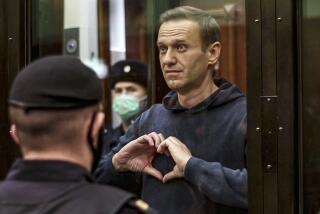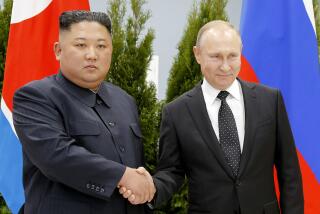U.S.-Cuba thaw could erode Russian influence with Havana allies
Cubans fearful of hostile U.S. neighbors have long counted on the Kremlin to ride to their rescue with military backing and economic infusions, even in the lean years that followed the collapse of the Soviet Union.
But if Havana and Washington could patch up their relationship after nearly 55 years of bitter division, as proposed by President Obama on Wednesday and echoed by Cuban President Raul Castro, what role would be left for isolated and cash-strapped Moscow to play on the faraway island?
The close collaboration Cuba enjoyed with the Soviet Union has diminished in the 23 years since the communist powerhouse devolved into its 15 constituent republics and cut back its foreign aid to leftist friends still fighting imperialism.
The ideology that tethered Cubans to Moscow has morphed in both countries. Russia now is in the grip of crony capitalism hit hard by Western sanctions over its aggression in Ukraine, while Cuba is dependent on remittances from U.S.- and Europe-based exiles to keep its people fed, clothed and equipped with cellphones and computers.
If, as the Obama administration hopes, a Cuban-U.S. reconciliation bolsters more trade and economic collaboration across the Florida Strait, the political symbiosis between Havana and Moscow could be expected to wither with time.
Fidel Castro and his younger brother, who has been Cuba’s leader since 2008, have deftly played Russia against the United States for decades, keeping alive the unspoken threat that the Kremlin’s omnipotent might was at the ready should the leftist revolutionaries need a defender.
The Moscow-Havana alliance was costly for the Kremlin in the best of times, and now that Russian President Vladimir Putin is watching his energy-financed economy tumble amid the collapse of world oil prices, the financial incentives that have survived the post-Cold War era can be expected to shrink, if not disappear.
The coinciding announcements in Washington and Havana on Wednesday that the two neighbors were reestablishing diplomatic relations caught Russians by surprise as much as they did the populations in the United States and Cuba. Until Wednesday, Russian media had been replete with stories about business conferences, trade delegations and new pacts with Cuba, envisioning joint ventures and expanded cooperation in everything from agriculture to space exploration.
Russian business leaders are in Havana this week to negotiate new deals with Cuban companies in the spheres of pharmaceuticals, health, agribusiness, transportation, communications, energy and mining and tourism, the Cuban ACN news agency reported.
Cuba and Russia are also reportedly in the process of renewing intelligence collaboration. After Putin’s visit to Cuba in July, the Russian business newspaper Kommersant reported that the two nations’ presidents agreed to reopen the former Soviet base in Lourdes, just west of Havana on the coast. Reopening the base mothballed in 2001 was part of a deal between the Cold War allies to write off $30 billion in Soviet-era debt that Havana owed Moscow.
Part of the Lourdes base, which was used as a listening post on U.S. military and maritime activities across the strait, was converted to a Cuban computer science training center a decade ago and part of it was left unattended. No time frame for reopening the facility for surveillance was mentioned, and reports in Western media on the neglected state of the base suggest that it would require major investment to restore.
Cuba also reportedly agreed to let Russia install a global positioning system on the island as part of a space cooperation agreement penned during Russian Prime Minister Dmitry Medvedev’s visit early last year.
Better relations between the United States and Cuba also could undermine Russia’s expectation of Havana’s backing in political and diplomatic confrontations that pit the former superpowers against each other. In late November, after the Russian-backed separatists occupying parts of eastern Ukraine held dubious elections for leaders of their purportedly independent republics, the Tass news agency reported that representatives of the proclaimed People’s Republics of Donetsk and Luhansk planned to travel to Cuba and Venezuela to seek diplomatic recognition of their sovereignty.
In his announcement of the new efforts to boost relations, Obama alluded to the likelihood that Cuba and the United States will continue to struggle with contentious issues. Havana’s longstanding alliance with Moscow is likely to be one of them, although Russia’s economic woes may hamper its ability to provide aid or trade in energy and consumer goods, which would be considerably more affordable coming from the United States.
Perhaps cognizant of the looming loss of Cuba as a thorn in the side of U.S. foreign policy but also as a drain on Moscow’s budget, Russian officials greeted the announced intention of improving U.S.-Cuba ties as a positive step for both sides.
“If those measures Washington has spoken about are put into effect, it will help to improve the situation around Cuba and it will be a positive event for us,” Russian Deputy Foreign Minister Sergei Ryabkov told Russia Today television.
Follow @cjwilliamslat for the latest international news 24/7
More to Read
Start your day right
Sign up for Essential California for news, features and recommendations from the L.A. Times and beyond in your inbox six days a week.
You may occasionally receive promotional content from the Los Angeles Times.







